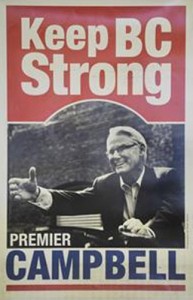Legislators Framing Climate Bills Hold Energy Stock (WSJ)
Rep. Waxman Gives Himself Another Day to Finish Climate Talks With Farm State Democrats
Rep. Waxman Gives Himself Another Day to Finish Climate Talks With Farm State Democrats (NYT)
B.C. Economist: Carbon Tax Was Election Albatross
B.C. Economist: Carbon Tax Was Election Albatross (Vancouver Sun)
Krugman Backs Waxman-Markey
Krugman Backs Waxman-Markey … (NYT column)
BC Voters Stand By Carbon Tax
Climate campaigners across North America awoke this morning and smelled the coffee: a resounding electoral victory in British Columbia.
Voters in Canada’s third-largest province yesterday returned to power, for a third four-year term, BC premier Gordon Campbell and his Liberal Party, who last July instituted the Western Hemisphere’s first major carbon tax.
We’ll let AFP news service report for us (emphases added):
British Columbia re-elects Liberals (May 13)
VANCOUVER, Canada (AFP) — Voters in Canada’s westernmost province kept a controversial carbon tax by re-electing the provincial government and rejected a landmark referendum for proportional representation.
As the British Columbia elections agency reported more than 60 percent of votes had been counted, the pro-business Liberals held a strong lead, with nearly 46 percent of votes compared to slightly more than 42 percent for the left-wing opposition New Democratic Party.
Two hours after the polls closed, New Democratic leader Carole James conceded defeat…
The Liberals and New Democrats, the province’s two main parties, had sparred during the campaign over issues including the economy, homelessness and several local scandals. But the environment — and especially the carbon tax — became the key election issue.
The tax, the first straight carbon tax in North America, was introduced by the government of British Columbia Premier Gordon Campbell in 2007 [ed. note: 2008] to help fight climate change. The tax is revenue neutral — the collected tax money is paid once a year to provincial residents.
The New Democrats, led by Carol James, fiercely opposed the carbon tax, arguing that it especially hurt rural residents. But the party’s opposition to the tax cost them the support of almost all environmental organizations, which sided with Campbell solely on the issue, while the nonpartisan Conservation Council launched a campaign telling voters to choose “anybody but James.”
The Green Party, which garnered slightly more than eight percent of total votes in early results, supported the carbon tax. But Green Party leader Jane Sterk was defeated in her home riding on Vancouver Island.
The election win gave Campbell a third term — a rare occurrence in the province — with his party holding a majority of British Columbia’s 85 legislature seats.
While elections are not referenda, the AFP report makes clear that the carbon tax stood front and center in the BC voting. After scanning hundreds of articles on the two-month campaign (and being interviewed for a handful, as well as appearing on Vancouver radio), our reading is that voters rewarded the Liberals for sticking to principle and standing up to the NDP’s withering attacks, as much as for the substance of the carbon tax itself.

The BC carbon tax took effect on July 1, 2008 at a rate of $10 (Canadian) per metric ton of carbon dioxide. Converting currencies and metrics, it equates to a very modest $7.80 per ton of CO2. However, the tax is to rise each year through 2012 by half the original amount, reaching the U.S. equivalent of around $11.75/ton this July 1 and, in 2012, around $23.50.
A U.S. carbon tax at that level would raise petrol prices by approximately 23 cents a gallon and national-average electricity prices by around 1.7 cents a kilowatt-hour. (Virtually all power generation in British Columbia is hydro-electric, so the carbon tax effectively exempts electricity.)
The BC tax is revenue-neutral, with revenues returned to taxpayers through personal income and business income tax cuts. The Feb. 19, 2008 BC Budget and Fiscal Plan spells out the tax’s rationale, impacts and mechanics, and is essential reading for any carbon tax advocate seeking to master communication tools for making a carbon tax palatable to the public.
In an e-mail to the Carbon Tax Center yesterday, American climatologist and climate campaigner James Hansen said, “The important thing is to get on the right policy track at the beginning — the policy must attack the fundamental problem, that dirty fossil fuels are the cheapest energy because they are not made to pay their costs to society.” Yes, carbon taxes must eventually reach high levels, but what matters now is that one major jurisdiction has gotten on the right policy track.
U.S. climate campaigners, mired in cap-and-trade murk, could learn from yesterdays’ election. At the very least, we owe a big debt of gratitude to BC Premier Gordon Campbell and his Liberal Party for political courage, and likewise to the voters of British Columbia for rewarding that bravery in the voting booth.
Photo: Flickr / Skagit IMS
Carbon Tax Wins: Cheap Politics Loses in B.C. Election
Carbon Tax Wins: Cheap Politics Loses in B.C. Election (DeSmogBlog)
Another Take On The Cap Vs. Tax Debate
Another Take On The Cap Vs. Tax Debate (The New Republic – Bradford Plumer in the Vine)
Climate-Blogger Romm Blasts Hansen's Carbon Tax Advocacy
Climate-Blogger Romm Blasts Hansen’s Carbon Tax Advocacy (Climate Progress)
Dingell Says Tax is Better, More Efficient and Fairer
Dingell Says Carbon Tax is Better, More Efficient and Fairer (Politico)
Brad Plumer's First Take on Waxman-Markey
Brad Plumer’s First Take on Waxman-Markey (The Vine)
- « Previous Page
- 1
- …
- 42
- 43
- 44
- 45
- 46
- …
- 48
- Next Page »
